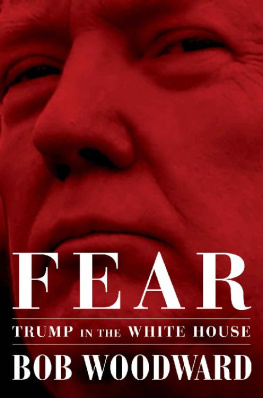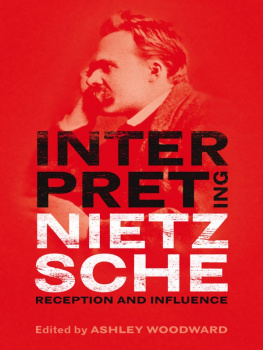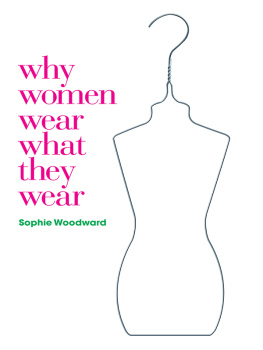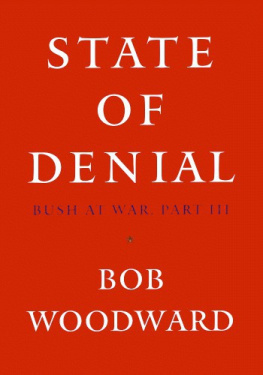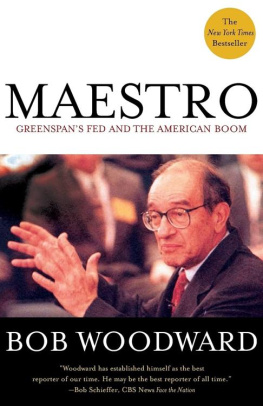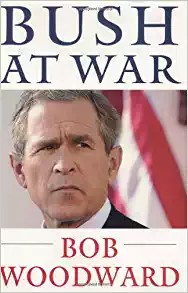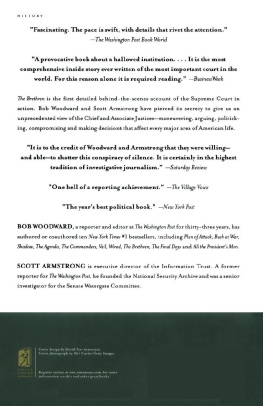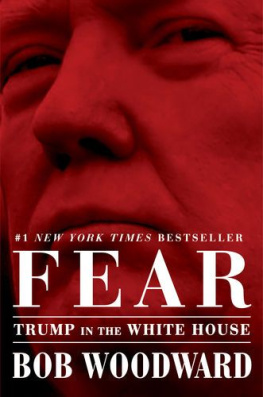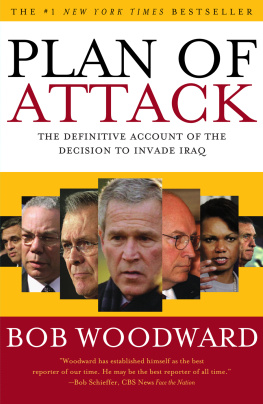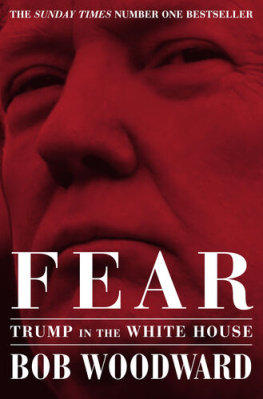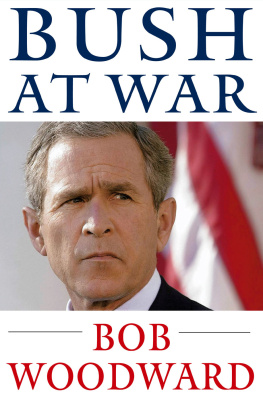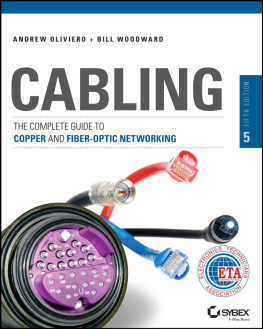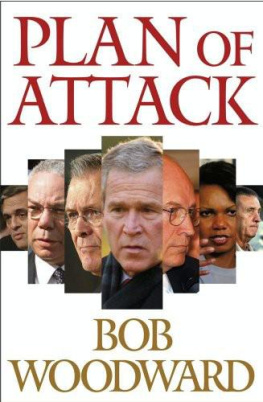Woodward - State of Denial: Bush at War: [Part III]
Here you can read online Woodward - State of Denial: Bush at War: [Part III] full text of the book (entire story) in english for free. Download pdf and epub, get meaning, cover and reviews about this ebook. year: 2007, publisher: Simon and Schuster, genre: Detective and thriller. Description of the work, (preface) as well as reviews are available. Best literature library LitArk.com created for fans of good reading and offers a wide selection of genres:
Romance novel
Science fiction
Adventure
Detective
Science
History
Home and family
Prose
Art
Politics
Computer
Non-fiction
Religion
Business
Children
Humor
Choose a favorite category and find really read worthwhile books. Enjoy immersion in the world of imagination, feel the emotions of the characters or learn something new for yourself, make an fascinating discovery.
- Book:State of Denial: Bush at War: [Part III]
- Author:
- Publisher:Simon and Schuster
- Genre:
- Year:2007
- Rating:5 / 5
- Favourites:Add to favourites
- Your mark:
- 100
- 1
- 2
- 3
- 4
- 5
State of Denial: Bush at War: [Part III]: summary, description and annotation
We offer to read an annotation, description, summary or preface (depends on what the author of the book "State of Denial: Bush at War: [Part III]" wrote himself). If you haven't found the necessary information about the book — write in the comments, we will try to find it.
State of Denial: Bush at War: [Part III] — read online for free the complete book (whole text) full work
Below is the text of the book, divided by pages. System saving the place of the last page read, allows you to conveniently read the book "State of Denial: Bush at War: [Part III]" online for free, without having to search again every time where you left off. Put a bookmark, and you can go to the page where you finished reading at any time.
Font size:
Interval:
Bookmark:

The Secret Man
(with a Reporters Assessment by Carl Bernstein)
Plan of Attack
Bush at War
Maestro: Greenspans Fed and the American Boom
Shadow: Five Presidents and the Legacy of Watergate
The Choice
The Agenda: Inside the Clinton White House
The Commanders
Veil: The Secret Wars of the CIA 19811987
Wired: The Short Life and Fast Times of John Belushi
The Brethren
(with Scott Armstrong)
The Final Days
(with Carl Bernstein)
All the Presidents Men
(with Carl Bernstein)
 | SIMON & SCHUSTER Rockefeller Center 1230 Avenue of the Americas New York, NY 10020 |
Copyright 2006 by Bob Woodward
All rights reserved,
including the right of reproduction
in whole or in part in any form.
S IMON & S CHUSTER and colophon are registered trademarks of Simon & Schuster, Inc.
Library of Congress Cataloging-in-Publication Data is available.
ISBN-13: 978-0-7432-9325-9
ISBN-10: 0-7432-9325-8
Visit us on the World Wide Web:
http://www.SimonSays.com
To Mary Walsh
T WO PEOPLE HAVE HELPED me at every stage of this book, working out of third-floor offices in my home in Washington, D.C.
Bill Murphy Jr., a former reporter and an attorney who practiced in the Army Judge Advocate Generals Corps and the Department of Justice, saw that I needed to do a third book on President Bush with the focus on the Iraq War. Honest, straightforward and insistent on fairness and the truth, he is a natural reporter, winning the trust of a number of key sources. Focused and incredibly resourceful, Bill became my partner. Authors only rarely get such maturity, skill and wise counsel from one person. Without him, I never would have finished this book, which is as much his as mine.
Christine Parthemore, a 2003 Phi Beta Kappa political science graduate of The Ohio State University, is a kind of Wonder Woman of the Information Age, capable of finding any information or any person. She has never let me down. Meticulous and diligent in every task from transcribing hundreds of hours of interview tapes to editing the manuscript, she is learned, frank, and smart. A natural editor, she knows how to get to the heart of matters. As she demonstrated every day, Christine has the energy of half a dozen and an endless capacity for work.
I N LATE D ECEMBER 2000, less than a month before his inauguration, President-elect George W. Bush was still debating who should be his secretary of defense. Former Senator Dan Coats, an Indiana Republican who had served on the Armed Services Committee, had been at the top of Bushs list and had the backing of his conservative base. But Coats had not been impressive in his interview with Bush and Vice Presidentelect Dick Cheney, who was heading the transition team for the new government. Coats knew the top generals mostly from a distance and was lukewarm on the national missile defense system Bush had promised in the campaign. He had never run a large organization and he acknowledged he would need a strong, experienced number two at the Pentagon.
It wouldnt work. Bush needed someone who could not only battle things out with the generals but who also had as much gravitas as the rest of his new national security team. Cheney had been secretary of defense under Bushs father; Colin Powell, Bushs pick for secretary of state, had been chairman of the Joint Chiefs of Staff and Reagans national security adviser. He needed a secretary of defense with more stature, grit and experience.
What about Donald Rumsfeld? Cheney suggested. Rumsfeld, 68, Cheneys old boss and mentor, had the dream rsum. He had been secretary of defense once before, under President Ford from 1975 to 1977. He had been a Navy pilot in the 1950s, elected to four terms in Congress, served as Fords White House chief of staff, and been the CEO of two Fortune 500 companies. Theyd been talking about making Rumsfeld CIA director, but maybe that wasnt right. Maybe they needed him back at Defense.
Three days before Christmas, Bush, Cheney and Rumsfeld had a long meeting and lunch. Wiry, cocky, confident with a boyish intensity, Rumsfeld seemed only half his age. He blew into the meeting like a tornado, full of excitement and vision. He knew the Pentagon; he had recently headed commissions on the use of space and the ballistic missile threat. He seemed to know everything.
Bush was surprised to be so impressed. Afterward, he spoke with his incoming White House chief of staff, Andrew H. Card Jr.
Bush had selected Card, 53, because his father said there was no more loyal person. Back in 1988, Card had been instrumental in his fathers win in the critical New Hampshire primary. Later, Card had been Bush seniors deputy White House chief of staff and transportation secretary.
After the 2000 election, Card thought he would be asked to run the transition team. No, Im not talking about that job, Bush told him. Im talking about the big one. They would have to have a completely candid, unique relationship, Card insisted, setting out his conditions for becoming chief of staff. Access to all people, meetings and information. I also cant be a friend, Card said.
Of course, Bush said.
In November, weeks before the Supreme Court settled the election in his favor, Bush announced Cards appointment, intentionally sending the strongest signal: Besides the vice president, Andy Card would be first among equals in the Bush White House, on all matters, at all times.
C OATS SEEMED LIKE a good man, Bush told Card, but the contrast with Rumsfeld was stunning. Rumsfeld understood what military transformation meantmaking the weapons and troops more mobile, swifter, higher-tech and more lethal. He was so impressive, Bush said. This is what has to be done. This is how to do it. These are the kinds of people it takes. It was as if he already had a plan. Rumsfeld was 43 when he had the job a quarter century ago. It was as if he were now saying, I think Ive got some things Id like to finish.
There was another dynamic that Bush and Card discussed. Rumsfeld and Bushs father, the former president, couldnt stand each other. The two had been the young GOP stars in the 1970s, and there was a lingering animosity between them. Bush senior thought Rumsfeld was arrogant, self-important, too sure of himself and Machiavellian. He believed that in 1975 Rumsfeld had maneuvered President Ford into selecting him to head the CIA. The CIA was at perhaps its lowest point in the mid-1970s. Serving as its director was thought to be a dead end. Though things had turned out differently, Bush senior didnt trust Rumsfeld. Rumsfeld had also made nasty private remarks that Bush was a lightweight, a weak Cold War CIA director who did not appreciate the Soviet threat and was manipulated by Secretary of State Henry Kissinger.
Card could see that overcoming his skepticism about Rumsfeld added to the president-elects excitement. It was a chance to prove his father wrong. And Rumsfeld fit Cheneys model.
Cheney had been in charge of the search for Bushs running mate. Hed said he was looking for someone with a broad range of experience. An ideal candidate would know the White House and Congress, have held elected office, have run a large federal executive department. He also had to be someone who wasnt just a creature of Washington. He had to have experience in the real world, the corporate world perhaps. A CEO, for example. Perhaps it was not surprising that Cheney, who had been a congressman, White House chief of staff, secretary of defense and Fortune 500 CEO, would value his own experience and model the ideal candidate after himself. Bush got the message and picked Cheney as his running mate. Now, Cheney seemed to have done it again. He had set up a model for secretary of defense that mirrored his own rsum. Cheney thought Bush needed a Cheney at the Pentagon. Nobody resembled Cheney more than Rumsfeld. On paper, at least, they looked almost perfect.
Font size:
Interval:
Bookmark:
Similar books «State of Denial: Bush at War: [Part III]»
Look at similar books to State of Denial: Bush at War: [Part III]. We have selected literature similar in name and meaning in the hope of providing readers with more options to find new, interesting, not yet read works.
Discussion, reviews of the book State of Denial: Bush at War: [Part III] and just readers' own opinions. Leave your comments, write what you think about the work, its meaning or the main characters. Specify what exactly you liked and what you didn't like, and why you think so.

![Woodward State of Denial: Bush at War: [Part III]](/uploads/posts/book/211038/thumbs/woodward-state-of-denial-bush-at-war-part-iii.jpg)

